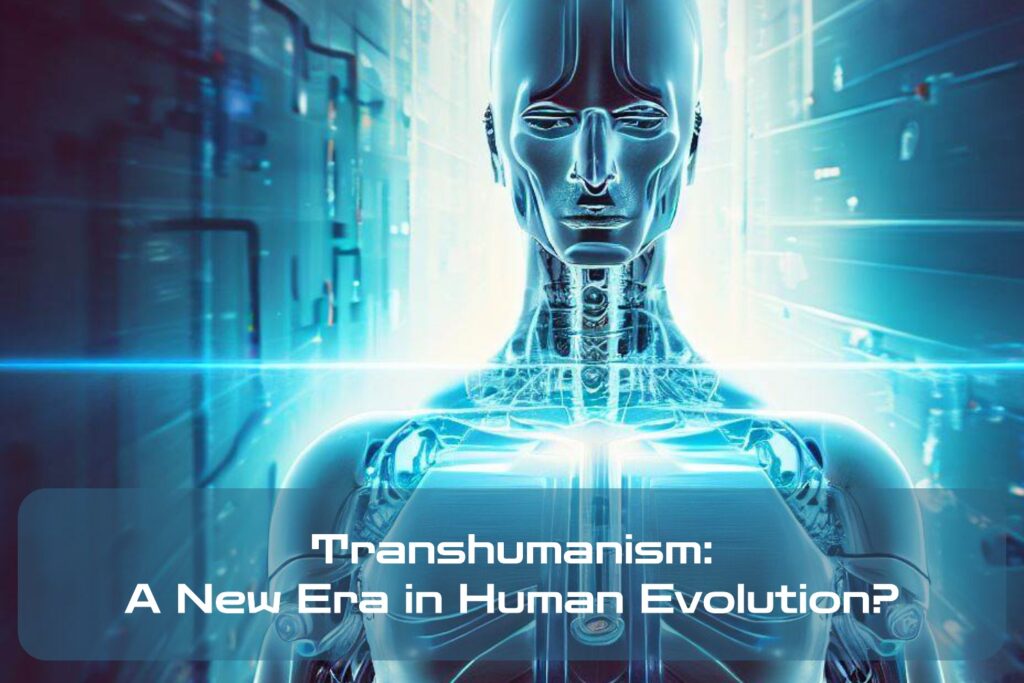Transhumanism is a movement that advocates the use of science and technology to improve the human condition. At its core, transhumanism seeks to enhance human abilities beyond what is currently possible through natural means, such as genetic engineering, cybernetics, and nanotechnology. The ultimate goal of transhumanism is the creation of a post-human species that will be smarter, stronger, healthier, and more long-lived than humans.
The Brief History of Transhumanism
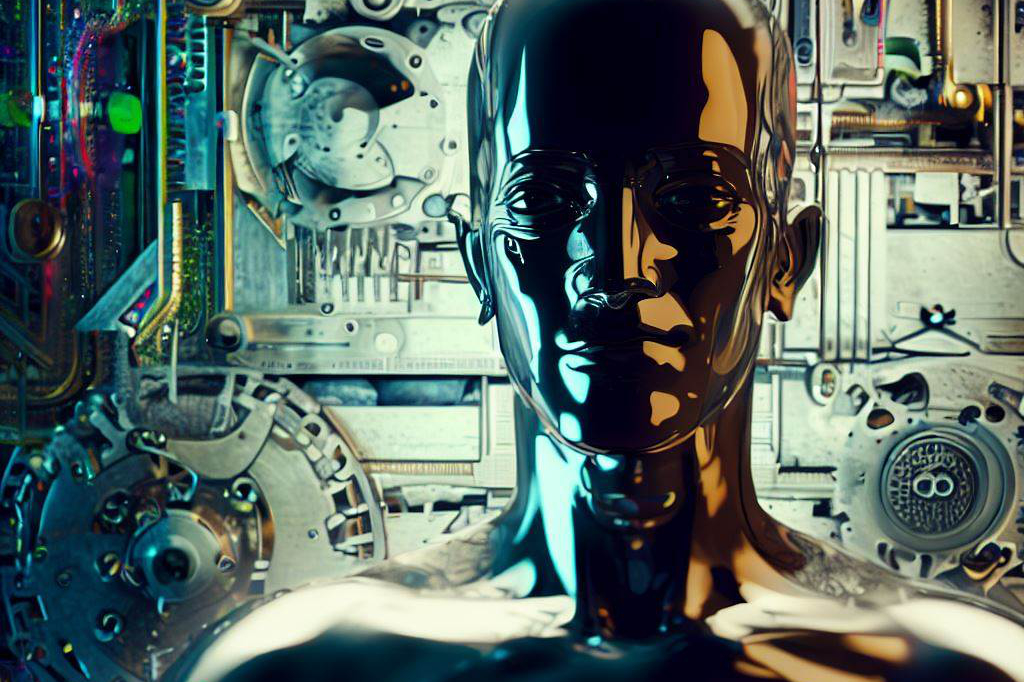
The concept of transhumanism has been around for centuries. In Greek mythology, there were tales of gods who possessed extraordinary powers that made them superior to humans.
During the Renaissance period in Europe, alchemists attempted to create elixirs of life that would grant immortality. However, modern transhumanism began to take shape in the 20th century with the emergence of science fiction literature that explored the possibilities and implications of human enhancement.
In 1957, Julian Huxley coined the term “transhumanism” in his paper “New Bottles for New Wine” He envisioned a future where humanity would become “the master builder of its own destiny” through technological progress. Since then, various groups and organizations have taken up the banner of transhumanism and continue to push forward research and development into human enhancement technologies.
The Purpose of This Article
The purpose of this article is to explore the societal implications of transhumanism and its potential impact on our world order. While there are many promising benefits associated with transhumanist technologies, such as medical advancements and increased intelligence and creativity – there are also negative implications, such as social inequality and ethical concerns surrounding the loss of human identity. Furthermore, we will delve into niche subtopics like impacts on religion, spirituality, the labor market and economy, education and learning, environmental sustainability, and cultural diversity.
This article will address the potential for a post-human society and the role of governments in regulating transhumanist technologies. The aim is to provide a well-rounded perspective on this topic and foster discussion about how we can responsibly manage these advancements without losing our human values.
The Societal Implications of Transhumanism
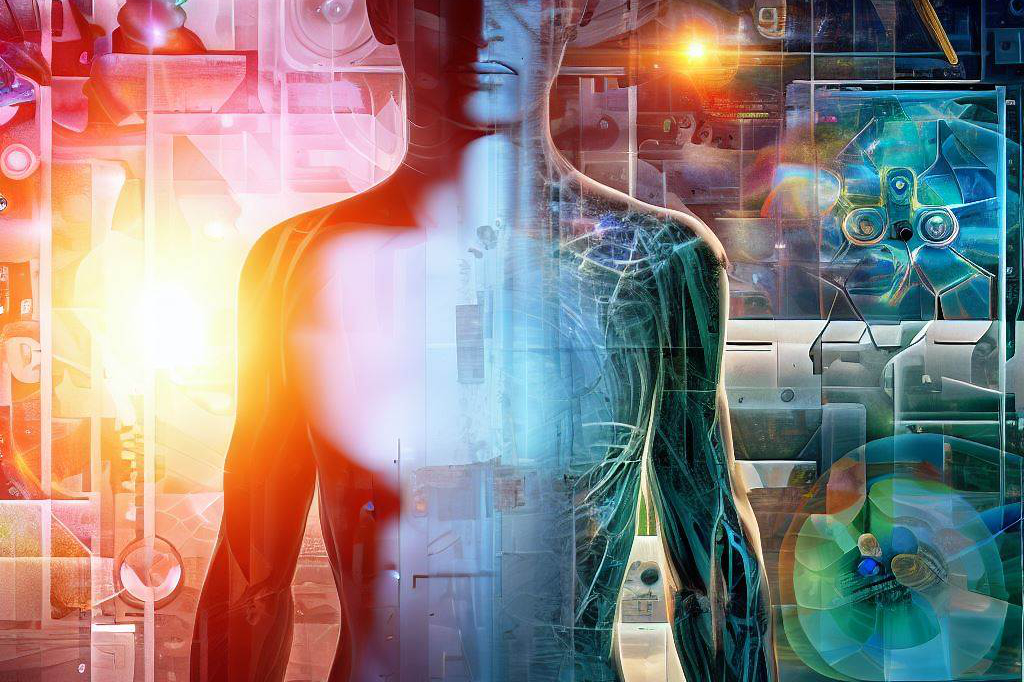
Positive Implications
The implications of transhumanism on society have been the subject of much debate.
There are those who argue that transhumanism has the potential to bring about significant positive changes in society.
One of the key positive implications of transhumanism is in the field of medicine. Transhumanist technologies can significantly improve human health and extend lifespans.
Medical advancements such as nanotechnology, gene editing, and prosthetics can help people overcome physical limitations and disabilities. Another positive implication is that transhumanist technologies could increase intelligence and creativity.
By enhancing cognitive abilities, humanity could unlock new avenues for innovation and creativity. This could lead to a more enlightened society with improved problem-solving capabilities.
Transhumanist technologies could also enhance physical abilities beyond human limitations. Exoskeletons, for example, would provide humans with increased strength and endurance beyond what is currently possible.
Negative Implications
However, there are also negative implications associated with transhumanism that must be considered.
One major concern is social inequality. The cost of these advanced technologies may only be affordable for a small percentage of people, leading to an even greater divide between the haves and have-nots.
Additionally, there are ethical concerns regarding the use of these technologies, such as gene editing or artificial intelligence (AI). There are fears that these technologies may be used in ways that endanger human lives or create unforeseen consequences.
One concern with transhumanism is the potential loss of human identity as we know it today. With advanced technology comes the ability to manipulate our own genetics or even consciousness itself which raises questions about what it means to be human.
While there are certainly positive implications associated with transhumanism, such as medical advancements or enhanced physical abilities; we should not ignore potential negative outcomes such as social inequality, ethical concerns, and the loss of human identity.
It is important to carefully consider both the positive and negative implications as we move forward with this emerging field of technology.
A New World Order?

Transhumanism is a movement aimed at fundamentally changing the human condition by enhancing human abilities through the use of technology. This has led to discussions of a potential new world order where humans may no longer be the only dominant species on earth.
The concept of technological singularity, where machine intelligence surpasses human intelligence, has become a central focus of transhumanist thought. Some transhumanists believe that once this point is reached, it will mark the emergence of a new species that merges with machines.
Technological Singularity and the Emergence of a New Species
Technological singularity refers to the hypothetical event in which artificial intelligence surpasses human intelligence. Many transhumanists view this as an important moment in history, as it could mark the emergence of a new species that merges with machines.
This fusion could result in humans possessing superhuman abilities such as increased speed, strength, and intelligence. This idea has led to debates about whether such an event would be positive or negative for humanity.
Proponents argue that becoming part-machine would give humans greater control over their own evolution and allow us to transcend our biological limitations. However, opponents argue that such a merger could lead to the loss of humanity’s unique qualities and values.
The Potential for A Post-Human Society
The possibility of creating post-human societies is another topic explored by transhumanism enthusiasts.
In theory, these societies would consist largely or entirely of post-humans who have merged with machines and possess enhanced cognitive abilities beyond those available to ordinary humans.
While exciting in theory, there are valid concerns about the impact this may have on society as we know it today. For instance, would post-humans still identify with regular humans or see themselves as an entirely separate entity?
Would they still share common values and interest in preserving traditional forms culture?
These are just some of the questions that remain unanswered.
The Role of Governments in Regulating Transhumanist Technologies
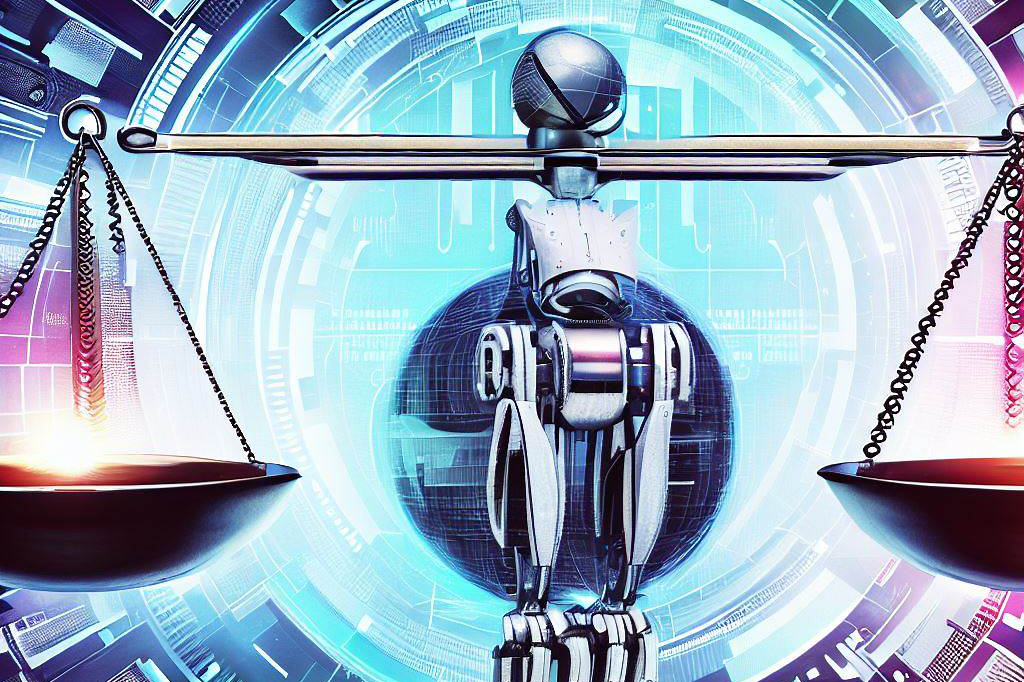
As transhumanist technologies continue to advance, governments around the world are becoming increasingly interested in regulating their development and use. One concern is the possibility of creating a two-tiered society in which only the wealthy can afford advanced enhancements, leaving others behind.
Another issue is the ethical concerns surrounding the development of such technologies. For instance, there are fears that some governments or corporations might use such technology for unethical purposes or that it may be used to compromise personal privacy and freedom.
Governments have a crucial role to play in ensuring that these technologies are used ethically and don’t create wider societal inequalities. But finding a balance between innovation and regulation will be critical as we move towards an era where humans can augment themselves with technology.
Niche Subtopics on Societal Implications of Transhumanism
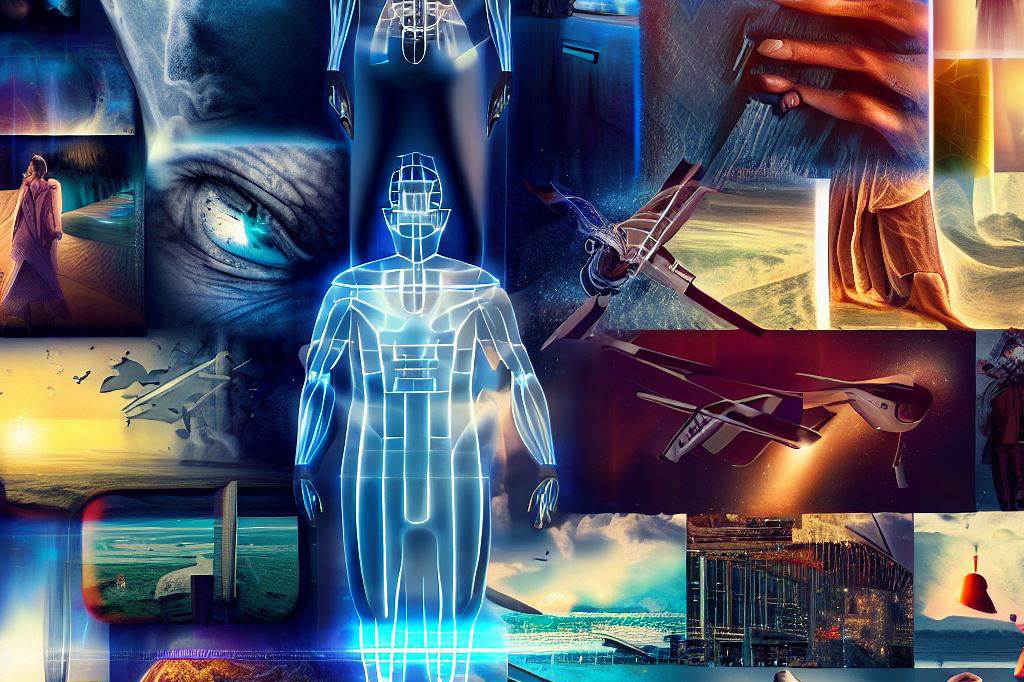
Impact on Religion and Spirituality
Transhumanism is a philosophy that seeks to improve the human condition through the use of technology. However, this quest for perfection raises ethical, moral, and spiritual questions about what it means to be human.
For example, if we can transcend our biological limits and become immortal beings, does that mean we are playing god? How will this affect religious beliefs and practices?
Some argue that transhumanism’s emphasis on science and technology is a direct challenge to traditional religious beliefs. For example, proponents of transhumanism argue that technology can help us overcome death – something that religion has traditionally promised through the concept of an afterlife.
This could lead to a decline in religious participation as people turn away from traditional faiths in favor of technological solutions.
However, there are also those who argue that transhumanism and religion can coexist.
They suggest that transhumanism can be seen as an extension of the human desire for transcendence – something that has been present in many religious traditions throughout history. Furthermore, they argue that some aspects of transhumanist thinking – such as the pursuit of immortality or the development of superintelligence – may align with certain religious beliefs.
Effects on the Labor Market and Economy
The development of new technologies has always had an impact on employment opportunities and economic growth. However, the potential impact of transhumanist technologies could be much greater than anything we have seen before.
This is because many transhumanist technologies are designed not just to automate existing jobs but to fundamentally change what it means to work. One potential outcome is a world where human labor becomes less valuable due to the availability of highly advanced machines or even artificial intelligence capable of performing complex tasks previously only possible for humans.
In such a scenario, there would be fewer job opportunities for humans, leading to rising unemployment and social unrest. However, there are also those who argue that transhumanism could lead to a world where human labor is no longer necessary.
They suggest that automation powered by advanced artificial intelligence and robotics could create a post-scarcity economy where basic necessities are provided for free or at very low cost. This would allow humans to focus on more creative, fulfilling pursuits rather than having to work just to survive.
Impact on Education and Learning
Transhumanist technologies have the potential to revolutionize the way we learn and acquire knowledge.
For example, advanced brain implants or neural interfaces could allow us to instantly download information into our brains without having to spend years studying and memorizing it.
This would allow us to learn much faster and more efficiently than ever before. However, there are also concerns about how these technologies might impact traditional forms of education.
If we can simply download information into our brains, will there still be a need for schools or universities? Will the role of teachers become obsolete in a world where machines can impart knowledge directly into our brains?
Furthermore, there are ethical questions about the use of these technologies in education.
For example, if we can enhance our cognitive abilities through drugs or brain implants, will this create an unequal playing field between those who can afford such enhancements and those who cannot?
Will these technologies exacerbate existing inequalities in educational opportunities? These are important questions that must be considered as we look towards a future shaped by transhumanist technologies.
The Impact on Human Relationships
Transhumanism is poised to revolutionize the way humans interact with each other. One of the most significant ways it will do so is by blurring the lines between humans and machines. Already, we see people relying heavily on technology for communication and socialization, whether it’s through social media or video chatting.
With transhumanist technologies like brain implants and augmented reality becoming more advanced, we can expect even more integration of machines into our daily lives. However, this integration comes with risks.
As we become more reliant on technology for our social interactions, we risk losing essential aspects of what makes us human: our ability to empathize, connect emotionally, and form meaningful relationships based on shared experiences. Furthermore, those who are able to afford advanced transhumanist technologies may be able to enhance their social skills beyond what is possible for the average person, leading to a further divide between the haves and have-nots.
The Impact on Environmental Sustainability

Transhumanism has potential implications for environmental sustainability that are rarely discussed in mainstream discourse. On the one hand, transhumanist technologies could help us address some of the biggest environmental challenges facing humanity today.
For example, advances in nanotechnology could help us develop more efficient energy systems and reduce waste. On the other hand, there are also concerns that transhumanist technologies could exacerbate environmental degradation.
For example, as we rely increasingly on technology to replace natural functions (such as replacing trees with artificial oxygen generators), we risk losing vital ecological systems that rely on complex interconnections to function properly. Additionally, there are concerns that transhumanist technologies may facilitate unsustainable levels of consumption by making it easier for us to generate new resources or replicate ourselves without regard for limited resources.
The Impact on Cultural Diversity
Transhumanism has potential implications for cultural diversity that are also not often discussed in mainstream discourse. One of the most significant ways it could impact cultural diversity is by altering our perception of what it means to be human.
As we become more integrated with technology, we may begin to view ourselves less as biological organisms and more as machines. If this happens, it could lead to a homogenization of cultures around the world as people begin to adopt a more universal understanding of what it means to be human.
Alternatively, transhumanist technologies could also facilitate the preservation and celebration of cultural diversity by allowing people to enhance their abilities in culture-specific ways (for example, by developing brain implants that allow them to better understand complex tonal languages). Ultimately, the impact on cultural diversity will depend on how we choose to use these technologies and whether we can maintain respect for diverse cultures even as we embrace new forms of enhancement.
Final Thoughts

In the course of this article, we have explored the societal implications of transhumanism, a field that promises to revolutionize humanity through the use of advanced technologies. We have discussed the potential benefits and drawbacks of these technologies, including medical advancements, increased intelligence and creativity, enhanced physical abilities, social inequality, ethical concerns, and the loss of human identity. We explored the possible emergence of a new species as well as its impacts on religion and spirituality, labor markets and the economy, education, and learning.
The developments in transhumanist technology present both great opportunities as well as significant challenges for society. The potential benefits are numerous, but if left unchecked, they could potentially exacerbate existing inequalities in society, leading to unforeseen consequences. However, if governments adopt regulations that prioritize public safety over corporate profit margins when applying these new technologies, we may be able to achieve a balance between progress and risk.
As individuals within society, we should encourage dialogue between policymakers & scientists so we can explore possible solutions together. This would include creating policies aimed at preventing social inequality while also promoting widespread access to transformative technologies like genetic engineering or brain implants, which could enhance intelligence or creativity, among other things.
With collective effort toward responsible innovation adoption instead of reckless experimentation driven by profit margins alone; society can emerge with a more equitable and sustainable future.
FAQs: The Societal Implications of Tranhumanism
1. What is transhumanism and what are its societal implications?
Transhumanism is a philosophical movement that advocates for the enhancement of human capabilities through the use of technology. It explores the possibilities of merging humans with machines, aiming to transcend the limitations of the human body and mind. The societal implications of transhumanism are vast and complex, raising questions and concerns in various areas.
2. How does transhumanism impact the field of healthcare?
Transhumanism has the potential to revolutionize healthcare by offering advanced medical technologies and interventions. It could lead to the development of enhanced prosthetics, bioengineered organs, and genetic modifications that enhance human health and longevity. However, ethical dilemmas arise when considering the accessibility, affordability, and potential inequalities that may emerge as a result of these advancements.
3. What are the ethical considerations associated with transhumanism?
Transhumanism presents numerous ethical challenges that need careful consideration. One major concern is the potential divide between those who can afford enhancements and those who cannot, leading to societal disparities. Questions of personal identity, autonomy, and consent also arise when discussing the integration of technology into the human body. Additionally, the long-term effects of altering human biology and potential unintended consequences require thorough examination.
4. How does transhumanism intersect with artificial intelligence (AI)?
Transhumanism and AI have an interconnected relationship. AI advancements play a significant role in transhumanist endeavors by providing sophisticated algorithms, machine learning capabilities, and neural interfaces. The integration of AI with human cognition raises ethical questions regarding the potential loss of human agency and the risks associated with relying heavily on artificial intelligence.
5. What impact could transhumanism have on employment and the economy?
The integration of advanced technologies and artificial intelligence into the workforce, as envisioned by transhumanism, could have profound effects on employment and the economy. While it may lead to increased efficiency and productivity, there is a concern that certain jobs may become obsolete as automation takes over. This shift could create a need for retraining and reskilling, as well as potentially widening the income gap between those with transhuman enhancements and those without.
6. What role does transhumanism play in the debate on human enhancement?
Transhumanism is at the forefront of the debate on human enhancement. Advocates argue that embracing technological enhancements allows individuals to reach their full potential and overcome biological limitations. However, critics raise concerns about the commodification of the human body and the potential loss of human essence and authenticity. The debate centers around striking a balance between the benefits of enhancement and preserving the core values that define humanity.
7. How does transhumanism influence our understanding of mortality and immortality?
Transhumanism challenges conventional notions of mortality by seeking to extend human life and explore possibilities for achieving immortality. Through advancements in regenerative medicine, cryonics, and mind uploading, transhumanists aim to overcome the limitations of human lifespan. This raises profound philosophical questions about the nature of consciousness, personal identity, and the implications of living indefinitely.
8. What are the potential environmental impacts of transhumanism?
Transhumanism’s pursuit of enhancing human capabilities through technology may have environmental consequences. The production and disposal of advanced technologies require resources and can contribute to e-waste. Additionally, if transhumanism leads to an extended human lifespan, it may strain already limited resources and exacerbate existing environmental challenges.
9. How does transhumanism challenge societal norms and values?
Transhumanism challenges traditional societal norms and values by blurring the boundaries between what is considered natural and artificial. It prompts a reevaluation of concepts such as beauty, disability, and human uniqueness. These shifts in societal perspectives may result in debates over the definition of normalcy, acceptance of diversity, and the role of human agency in shaping our own evolution.
10. What are the potential legal and regulatory implications of transhumanism?
Transhumanism raises complex legal and regulatory questions. As the field advances, there will be a need for new frameworks to address issues such as privacy, informed consent, liability, and the equitable distribution of resources. Establishing guidelines and ethical standards will be crucial to ensuring the responsible development and deployment of transhumanist technologies.

C M, a seasoned editor, journalist, and consultant, is deeply fascinated by the convergence of technology, space, and the future of humanity.
With a particular interest in transhumanism, futurology, and the philosophical and ethical dimensions of these domains, C M serves as the lead contributor to TranscendSphere and SpaceSpotlight.
When not penning insightful articles on these rapidly evolving fields, C M indulges in their love for podcasts and books, proudly embracing their status as a ‘Happy Nerd Extraordinaire!’

